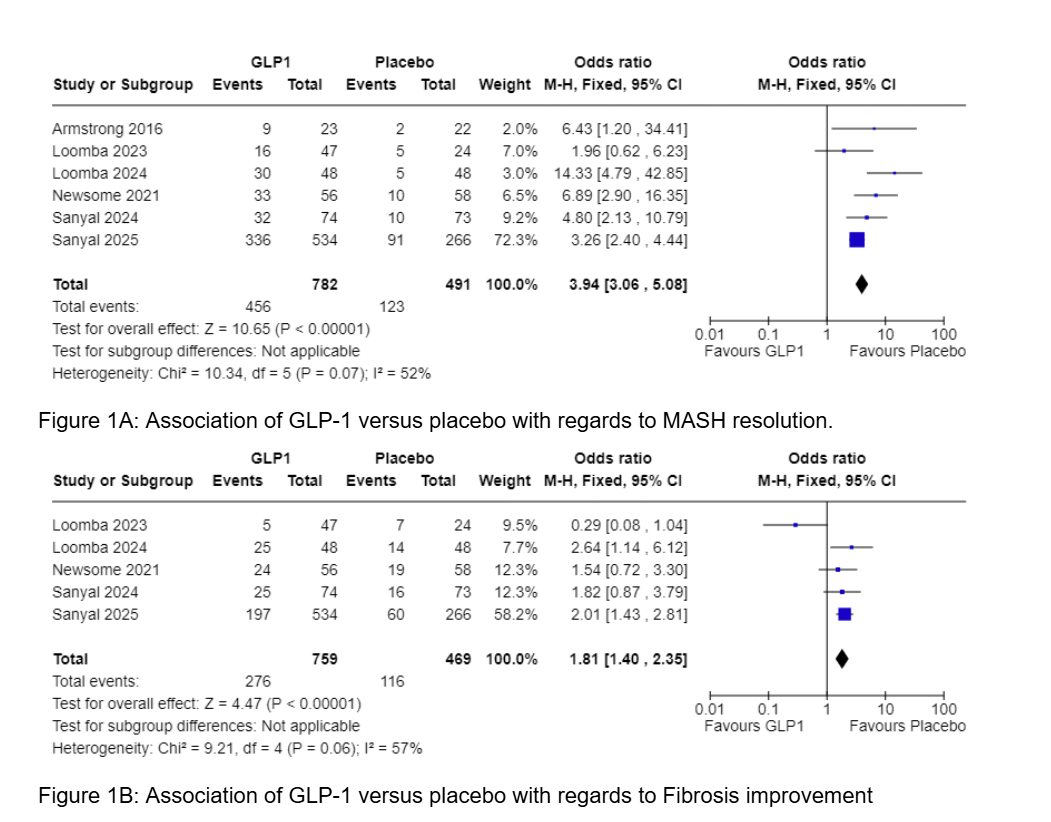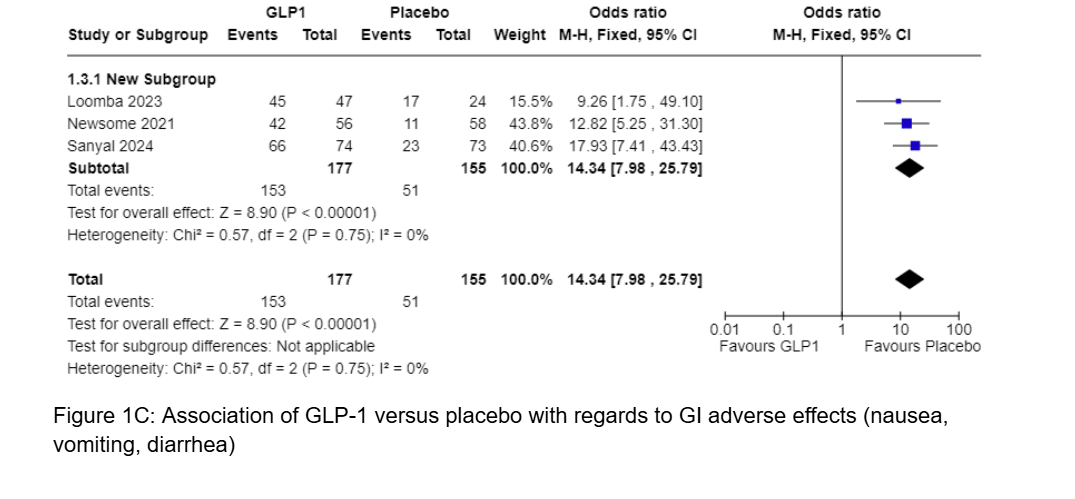Monday Poster Session
Category: Liver
P3746 - Efficacy of GLP-1 Receptor Agonists in MASH Resolution and Fibrosis Reduction: A Meta-Analysis
Monday, October 27, 2025
10:30 AM - 4:00 PM PDT
Location: Exhibit Hall
- RT
Rahul Tripathi, MD
Stony Brook Medicine
Stony Brook, NY
Presenting Author(s)
Award: ACG Presidential Poster Award
Rahul Tripathi, MD1, Shivani Gupta, MD1, James Lee, MD2, Nezar Zeidan, DO1, Michael Tao, MD3, Daniel Jamorabo, MD4
1Stony Brook Medicine, Stony Brook, NY; 2Stony Brook University Hospital, Stony Brook, NY; 3Hartford HealthCare, Middletown, CT; 4Northwell Health, Forest Hills, NY
Introduction: Metabolic Dysfunction-Associated Steatohepatitis (MASH) carries a long-term risk for morbidity and mortality driven primarily by liver fibrosis progression. Glucagon-like peptide-1 (GLP-1) receptor agonists, initially developed for diabetes mellitus management, have shown promise in slowing down MASH and associated fibrosis. We conducted a meta-analysis to evaluate the efficacy and safety of GLP-1 receptor agonists compared to placebo for MASH resolution, fibrosis improvement, and gastrointestinal (GI) adverse effects.
Methods: A systematic literature search was conducted across multiple databases, including Pubmed, Embase, and Web of Science, to identify RCTs comparing GLP-1 receptor agonists to placebo in adults with biopsy-confirmed MASH. Primary outcomes were MASH resolution and fibrosis improvement; secondary outcomes included GI adverse effects.
Results: Six RCTs with 1273 patients met the inclusion criteria. 782 patients were treated with GLP-1 receptor agonists and 491 with placebo. The average follow-up period was 57 weeks, with a median age of 54 and 45% of patients being male (Table 1).
GLP-1 receptor agonists were associated with a statistically significant resolution of MASH when compared to placebo (OR 3.94, 95% CI 3.06-5.08, P< 0.0001). GLP-1 receptor agonists also improved fibrosis compared to placebo (OR 1.81 95% CI 1.40-2.35, P< 0.0001). Safety endpoints included GI adverse effects, which were statistically significant when compared to placebo (OR 14.34 95% CI 7.98-25.79). The data are shown in Figures 1a, 1b, and 1c.
Discussion: The current meta-analysis demonstrates that GLP-1 receptor agonists significantly enhance fibrosis improvement in MASH patients compared to placebo, indicating their potential role in mitigating disease progression. These findings support their potential integration into clinical management guidelines, although further studies are warranted to clarify the long-term safety and effectiveness of these agents.

Figure: Figure 1A: Association of GLP-1 versus placebo with regards to MASH resolution.
Figure 1B: Association of GLP-1 versus placebo with regards to Fibrosis improvement

Figure: Figure 1C: Association of GLP-1 versus placebo with regards to GI adverse effects (nausea, vomiting, diarrhea)
Disclosures:
Rahul Tripathi indicated no relevant financial relationships.
Shivani Gupta indicated no relevant financial relationships.
James Lee indicated no relevant financial relationships.
Nezar Zeidan indicated no relevant financial relationships.
Michael Tao indicated no relevant financial relationships.
Daniel Jamorabo indicated no relevant financial relationships.
Rahul Tripathi, MD1, Shivani Gupta, MD1, James Lee, MD2, Nezar Zeidan, DO1, Michael Tao, MD3, Daniel Jamorabo, MD4. P3746 - Efficacy of GLP-1 Receptor Agonists in MASH Resolution and Fibrosis Reduction: A Meta-Analysis, ACG 2025 Annual Scientific Meeting Abstracts. Phoenix, AZ: American College of Gastroenterology.
Rahul Tripathi, MD1, Shivani Gupta, MD1, James Lee, MD2, Nezar Zeidan, DO1, Michael Tao, MD3, Daniel Jamorabo, MD4
1Stony Brook Medicine, Stony Brook, NY; 2Stony Brook University Hospital, Stony Brook, NY; 3Hartford HealthCare, Middletown, CT; 4Northwell Health, Forest Hills, NY
Introduction: Metabolic Dysfunction-Associated Steatohepatitis (MASH) carries a long-term risk for morbidity and mortality driven primarily by liver fibrosis progression. Glucagon-like peptide-1 (GLP-1) receptor agonists, initially developed for diabetes mellitus management, have shown promise in slowing down MASH and associated fibrosis. We conducted a meta-analysis to evaluate the efficacy and safety of GLP-1 receptor agonists compared to placebo for MASH resolution, fibrosis improvement, and gastrointestinal (GI) adverse effects.
Methods: A systematic literature search was conducted across multiple databases, including Pubmed, Embase, and Web of Science, to identify RCTs comparing GLP-1 receptor agonists to placebo in adults with biopsy-confirmed MASH. Primary outcomes were MASH resolution and fibrosis improvement; secondary outcomes included GI adverse effects.
Results: Six RCTs with 1273 patients met the inclusion criteria. 782 patients were treated with GLP-1 receptor agonists and 491 with placebo. The average follow-up period was 57 weeks, with a median age of 54 and 45% of patients being male (Table 1).
GLP-1 receptor agonists were associated with a statistically significant resolution of MASH when compared to placebo (OR 3.94, 95% CI 3.06-5.08, P< 0.0001). GLP-1 receptor agonists also improved fibrosis compared to placebo (OR 1.81 95% CI 1.40-2.35, P< 0.0001). Safety endpoints included GI adverse effects, which were statistically significant when compared to placebo (OR 14.34 95% CI 7.98-25.79). The data are shown in Figures 1a, 1b, and 1c.
Discussion: The current meta-analysis demonstrates that GLP-1 receptor agonists significantly enhance fibrosis improvement in MASH patients compared to placebo, indicating their potential role in mitigating disease progression. These findings support their potential integration into clinical management guidelines, although further studies are warranted to clarify the long-term safety and effectiveness of these agents.

Figure: Figure 1A: Association of GLP-1 versus placebo with regards to MASH resolution.
Figure 1B: Association of GLP-1 versus placebo with regards to Fibrosis improvement

Figure: Figure 1C: Association of GLP-1 versus placebo with regards to GI adverse effects (nausea, vomiting, diarrhea)
Disclosures:
Rahul Tripathi indicated no relevant financial relationships.
Shivani Gupta indicated no relevant financial relationships.
James Lee indicated no relevant financial relationships.
Nezar Zeidan indicated no relevant financial relationships.
Michael Tao indicated no relevant financial relationships.
Daniel Jamorabo indicated no relevant financial relationships.
Rahul Tripathi, MD1, Shivani Gupta, MD1, James Lee, MD2, Nezar Zeidan, DO1, Michael Tao, MD3, Daniel Jamorabo, MD4. P3746 - Efficacy of GLP-1 Receptor Agonists in MASH Resolution and Fibrosis Reduction: A Meta-Analysis, ACG 2025 Annual Scientific Meeting Abstracts. Phoenix, AZ: American College of Gastroenterology.

